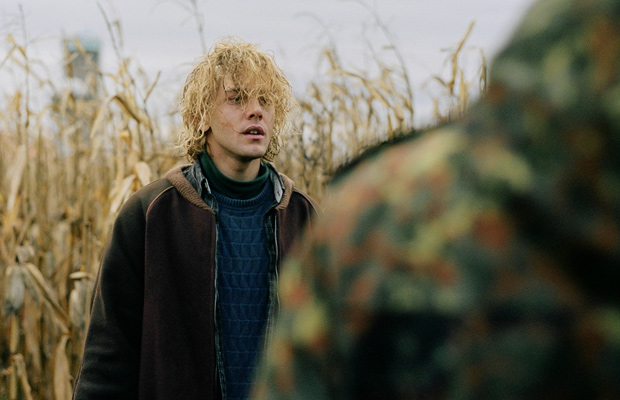I Need a Lover with a Farm Hand: Dolan’s Latest a Filet of Self Loathing
We quickly gather that Tom (Dolan) has recently lost his lover Guillaume in a mysterious accident as he scrawls desperate notes to himself on a napkin, trying to rationalize and contain the raging heartbreak he’s experiencing all by himself. He travels to visit Guillaume’s estranged mother Agathe (Lise Roy) and brother Francis (Pierre-Yves Cardinal) on their dairy farm in the rural countryside so that he may speak at Guillaume’s funeral. And it seems Tom has never met them for a reason; they have no idea that Guillaume was gay.
When Francis returns home to find Tom staying in his brother’s bed, a violent and aggressive interaction transpires in which we learn that Francis has always suspected his brother was ‘that way’ and threatens Tom not to reveal who he really is to their distraught mother. The somewhat unhinged Agathe is upset that Tom, a random friend shows up for her son’s funeral, but not the phantom girlfriend Francis has invented to heterosexualize Guillaume’s memory. Quickly, this hothouse of dysfunction becomes a mind fuck of power struggles between a broken Tom and two extremely damaged people living alone with no one else to talk to out on their isolated farm.
Tom at the Farm is intriguingly reminiscent of a host of classic queer theater in that we’re all clearly led to understand that Tom and Guillaume were lovers without anyone uttering explicit dialogue saying so. While we are as well aware of what’s going on as Francis is (whose actions belie a certain latent homosexuality as well), the film’s narrative is akin to psycho horror families of cinema past (yes, the Tallulah Bankhead/Stefanie Powers dynamic in Die Die My Darling certainly comes to mind considering the sexuality vs. religion angle) enhanced deliriously by Gabriel Yared’s Bernard Herrmann inspired score which may as well be a direct mimic of Psycho’s famous score.
While Dolan’s descent into Stockholm Syndrome victimhood is as frustrating as it is believable, we unfortunately never quite feel connected to what’s going on once all the cards are on the table. Cardinal, who reprises his role from the stage, is quite intensely magnetic, while dinner scenes with the obviously unbalanced Agathe, played eerily by Lise Roy, are the film’s most unnerving sequences. In the end, we’re left with the knowledge that rural landscapes offer hopelessness and degradation for the LGBT community, and with a protagonist that leaves us hating himself more than he did from the first frames.
Andre Turpin’s (who worked for Villeneuve on the incredible Incendies as well as Maelstrom) cinematography captures a bleak existence of unrelenting corn fields and hollowed out interiors. The farm doesn’t bode too well for Tom’s self-esteem, and Dolan’s latest, while perhaps not as wholly satisfying as it could have been, mines the time worn themes of the conditioned self-loathing neurosis that afflict a community unwelcome in rugged landscapes where masculine posturing and patriarchal traditions still reign supreme. If we only we had been led to care for Tom or his broken antagonists, then maybe the film could have been much more emotionally resonant.
Reviewed on September 6 at the 2013 Toronto International Film Festival – Special Presentations Programme.
